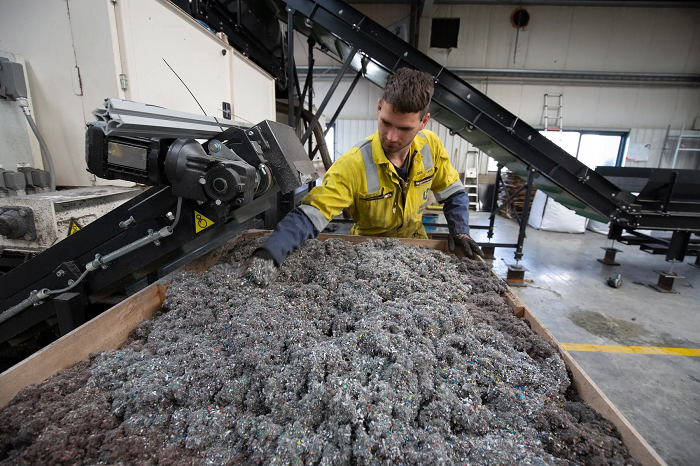FW
Global leader in sustainable technologies for the textile industry, Jeanologia will showcase its new denim collection titled, ‘Mediterranean Soul’ during a press tour tour at Kingpins Amsterdam.
The collection blends Mediterranean inspiration, creativity, and sustainability to showcase the future of denim.
The press tour will showcase how the combination of Laser and G2 Indra technologies enables hyper realistic finishes while protecting the planet and workers. It will also highlight the eDesigner platform, which connects digital design to real production, accelerating processes and reducing the need for physical samples.
The press tour will include live demonstrations, as well as opportunities to interview Jeanologia’s representatives.'
Global initiative dedicated to accelerating the use of post-consumer recycled cotton (POCR), Denim Deal will launch three new collections at this year’s edition of Kingpins Amsterdam. These collections prove, circular denim isn't just a goal but is ready to wear, ready to scale, and designed for every brand to easily adopt.
The new initiative, called The Denim Deal Collection: Designed to Simplify. Built to Prove., moves beyond simply showcasing members to actively co-creating ready-to-use collections. It includes the EMEA Hub Collection comprising nineteen garments, developed with partners including Dorlet, Sharabati, Kipas, Ereks Blue Matters, and PDNA. These garments highlight high-quality circular denim with a focus on cutting-edge design and full traceability.
The collection features removable branded buttons by Dorlet, fully integrated green production by Ereks, and PDNA’s platform, which verifies supply chain data and links it directly to each garment through a Digital Product Passport (DPP). This collection is a clear blueprint for making circularity visible and wearable.
Twp separate collections spearheaded by the Denim Deal India Hub will be launched integrating digital product passports, Product Environmental Footprint (PEF) powered by Green Story, POCR cotton, and advanced green wash technology.
Produced by Raymond UCO, the first collection will be featured at Kingpins while the second collection, produced by Bhaskar Denim, will be unveiled during their week-long Denim Deal show.
Both collections, created by Recyclr in collaboration with Jeanologia and Green Story, showcase the power of global hubs to create scalable, tailored solutions across different regions.
Both these collections provide brands with ready-made compliance solutions, and demonstrate what the entire denim ecosystem can achieve when it collaborates.
The Denim Deal plans to continue launching new collections showcasing different members, innovations, and increasing complexity, aiming for their ambitious goal: one billion pairs of jeans made with at least 20 per cent post-consumer recycled cotton by 2030. Brands ready to skip the complexity and scale circularity are invited to join now.
Spanish fashion giant Mango is reinforcing its UK retail network by opening 120 new seasonal roles across nearly 60 stores nationwide, preparing for the upcoming festive rush.
The brand is actively recruiting Sales Assistants to join its teams between October and December. This seasonal drive aims to strengthen the in-store experience during one of the busiest shopping periods of the year.
Successful applicants will receive a competitive salary alongside a robust benefits package, including a 35 per cent staff discount on all Mango garments and accessories, a seasonal uniform from the latest collections and an access to the brand’s Employee Assistance Program.
Each of these roles offers significant learning and development opportunities, such as training courses, mentoring, and the potential to transition into full-time or international positions within the company.
Fiona Cullen, International Regional Director - UK & Ireland, highlights, these roles offer valuable experience, great benefits, and the chance to be part of a global fashion brand at an exciting time of growth.
This recruitment push is tied to Mango's broader 2024-2026 4Es Strategic Plan, which focuses on driving UK sales and store expansion. The retailer currently operates over 80 points of sale in the UK and plans to open 20 new stores in 2025.
The brand recently opened a 5,300 sq ft 'New Med' concept store at St David’s Dewi Sant Shopping Centre in Cardiff and plans to launch a 7,104 sq ft flagship store at Festival Place shopping center in Basingstoke later this year.
This strategic investment follows a strong performance, with the retailer reporting a global turnover of €1.73 billion in H1, FY25, a 12 per cent Y-o-Y increase.
Australian clean technology company specializing in textile recycling, BlockTexx has entered into a strategic partnership with Asia Pacific Fibers (APF), an integrated polyester manufacturer based in Indonesia.
This collaboration is focused on developing and supplying textile-to-textile recycled polyester filament yarn solutions for the global apparel and fashion sectors.
BlockTexx uses its patented SOFT (Separation of Fibre Technology) process to chemically separate and recover polyester and cellulose from blended textile waste (like poly-cotton garments). The recovered polyester is marketed as PolyTexx rPET.
APF uses the PolyTexx rPET as a raw material to create its Re-petitive yarns. This manufacturing process minimizes water usage, chemical pollution, and landfill waste, achieving a truly circular solution.
The resulting yarns are designed to be commercial and competitive with virgin materials. They are made from 100 per cent recycled polymers and can include anywhere from 10 per cent to 50 per cent textile waste (from BlockTexx's PolyTexx).
The Re-petitive yarns are available in raw white, dope-dyed, and with inherent functional features such as stretch, moisture management, anti-UV, anti-microbial and biodegradability
The companies will jointly promote these commercially ready yarns to international textile markets to drive the uptake of scalable, circular fashion solutions.

In a landmark development for the Australian recycling sector, BlockTexx, a pioneer in textile waste recovery, has become the first company in the country to achieve the internationally recognized Global Recycled Standard (GRS) and Recycled Claim Standard (RCS) certifications. The move is a big step forward for an industry grappling with a mountain of discarded textiles and sets a new benchmark for transparency and trust in the burgeoning circular economy.
Innovative approach for circularity
The announcement, celebrated by industry leaders, validates BlockTexx's innovative approach to tackling a critical environmental challenge. Australia is a major contributor to the global textile waste crisis, with 600 million kgs of clothing and other textiles entering landfills each year. This not only consumes valuable land but also creates a major source of greenhouse gas emissions.
"Achieving GRS and RCS certification validates our chain of custody processes that provide trust and traceability for our feedstock customers as well as our outtake customers," said BlockTexx co-founder Graham Ross. His comments underscore the central role of verification in an industry where greenwashing claims can erode consumer confidence. The GRS, a voluntary product standard, provides a strong framework for tracking and verifying recycled content, ensuring that a product's sustainability claims are backed by a transparent and audited supply chain.
A major step towards sustainability
This milestone is a bellwether for the entire textile recycling industry in Australia. It signals a shift from a nascent sector to a more professional and economically viable one. As brands face increasing pressure from consumers and governments to reduce their environmental footprint, a certified supply chain becomes a non-negotiable asset.
The certification provides a crucial link between the end-of-life garment and its re-entry into the production cycle, offering brands a credible pathway to a circular business model.
While the industry still faces numerous hurdles, including the high cost of processing and the technical complexities of recycling blended fabrics, BlockTexx's success demonstrates that innovative solutions are paving the way forward.
The company's patented Separation of Fibre Technology (S.O.F.T.) tackles the challenge of mixed materials by breaking down textile waste into high-value raw materials. This process not only diverts waste from landfills but also creates a new, sustainable source of materials for manufacturing.
With a growing government push for a circular economy and schemes like the national clothing stewardship scheme, Seamless, holding brands accountable, the future of textile recycling in Australia looks increasingly promising. The GRS certification of BlockTexx is more than just a company achievement; it is a signal to the market that Australia is serious about building a sustainable and transparent recycling industry. It provides a blueprint for other players to follow, encouraging greater investment, innovation, and collaboration to transform the fashion industry from a linear "take-make-dispose" model to a truly circular and sustainable one.
A leader in the precious metals industry, Heraeus Precious Metals and an international specialist in textile chemistry, Rudolf have signed an agreement to exclusively market products featuring Heraeus’ AGXX technology for textile finishing and care. This groundbreaking antimicrobial innovation is poised to permanently transform the textile industry.
AGXX works fundamentally differently from conventional biocides, especially traditional silver technologies. The innovation is based on a catalytic reaction triggered by the interaction of two precious metals.
It works by converting oxygen into reactive oxygen species in presence of air humidity. These species actively kill odor-causing and other microorganisms.
The mechanism relies on a circular redox system, meaning the AGXX technology is not consumed but is continuously regenerated, offering long-lasting effectiveness.
The versatile technology can be seamlessly integrated into both textile finishing processes and directly into fibers and yarns.
By integrating the AGXX technology, Ruldolf is significantly expanding its portfolio with a technologically advanced solution for functionalizing textiles. This strategic move aims to solidify Rudolf’s position as an innovation leader in a dynamic market by offering customers market-ready products with differentiated value in the areas of initial finishing, care, and aftercare applications.
Martin Danz, Global Head - Antimicrobial Technologies, Heraeus Precious Metals, says, the partnership is significant step towards the further development of the textile market.
Marcos Furrer, CEO, Rudolf, adds, the partnership sends a clear message that the company combines two strong innovative forces to give the textile industry new impulses.
Together, the two companies plan to continue developing new application
In partnership with major global retailers including Bestseller, C&A, PDS, Reformation, and Target, Fashion for Good has launched the ‘Beyond50 Denim: Combining Cottonised Hemp and Green Chemistry’ project. The initiative aims to rapidly accelerate the use of hemp as a core, sustainable alternative to conventional cotton in the denim industry, a market projected to surpass $115 billion by 2029.
The current growth of the denim market is heavily dependent on conventionally cultivated cotton, a fiber whose resource-intensive methods - requiring substantial water and pesticide use = pose a significant environmental burden. While hemp offers a climate-resilient solution that uses fewer resources and improves soil health, its mainstream adoption has been severely limited. Historically, hemp content in denim rarely exceeds 20 per cent because manufacturers struggle to achieve the soft handfeel and aesthetic qualities that consumers expect from cotton.
To overcome this major hurdle, the project is validating the synergistic power of two pioneering innovations. These include the SEFF’s Nano-Pulse Technology, which transforms raw hemp into refined, cotton-like fibers. The second innovation is known as the proprietary chemistry Fihre52. This unique green chemistry solution is applied to impart a softer handfeel to the processed cellulosic fibers.
By combining these technologies, the project aims to demonstrate that hemp content can reliably exceed 20 per cent and reach 50 per cent and beyond in denim applications, all while maintaining performance and aesthetic parity with conventional cotton.
Katrin Ley, Managing Director, Fashion for Good, notes, overcoming barriers to adoption requires more than isolated technical advances. By strategically combining breakthrough fiber technology with green chemistry, the project shows how different innovations can work together to tackle long-standing challenges in the denim industry, she states.
The project includes key manufacturing partners Bossa (Turkey) and Nice Denim (Bangladesh), demonstrating a commitment to validating these solutions within the existing supply chain. This collaborative effort seeks to establish hemp as a mainstream, sustainable future for denim.
Driven by major global trade dynamics and a concerted effort by multinational retailers to diversify their sourcing away from China, India’s apparel export industry is undergoing a significant strategic shift. As per a recent report by Antique Research, the country’s strong manufacturing base, competitive labor costs and rapidly expanding product capabilities make it a key beneficiary of this transition.
While competitors like Bangladesh and Vietnam have historically dominated global apparel exports, India is quickly gaining ground. This shift is fueled by geopolitical realignments, trade tensions, and the rising global emphasis on building more sustainable and diversified supply chains—the so-called ‘China+1’ strategy.
This structural change is opening new doors for Indian garment manufacturers, supported by several domestic improvements, notes the report. These include an improving infrastructure and supply chain efficiency, incentives like the Production-Linked Incentive (PLI) schemes and enhanced adherence to international standards.
The United States and European Union remain India’s largest apparel markets, showing renewed interest in key segments like cotton garments, knitwear, and value-added fashion apparel.
Despite the positive momentum, the report warns of substantial challenges, primarily centered on market access. For instance, India lacks Free Trade Agreements (FTAs) with key markets, resulting in high import tariffs. For instance, Indian apparel exports to the EU face average tariffs of 9–12 per cent, while competitors like Bangladesh enjoy zero-duty access under the EU's Everything But Arms (EBA) initiative.
These tariff disadvantages are eroding India’s price competitiveness, making exports -especially in ready-made garments (RMG) and home textiles - less viable.
The industry is optimistic that a significant 25 per cent tariff could be lifted by the end of the fiscal year.
Beyond tariffs, Indian producers still grapple with hurdles like compliance costs, volatile cotton prices, and a fragmented manufacturing ecosystem. However, the forthcoming FTAs with the UK and EU are critical to leveling the playing field, the report notes.
If tariff barriers are successfully addressed and domestic supply chain reforms continue, India is well-positioned to significantly increase its market share of the $500-billion global apparel export market over the next decade.
India’s upcoming Diwali festival is expected to register record-breaking retail sales this year, marking the strongest festive season performance in a decade. The textiles and garments sector is forecast to be one of the main beneficiaries, even as potential challenges from the global market loom for exporters.
According to estimates from the Confederation of All India Traders (CAIT), Diwali trade could surpass Rs 4.75 lakh crore ($53.50 billion). Recent reductions in GST and Prime Minister Narendra Modi’s ‘Vocal for Local’ (Swadeshi) campaign are expected to give a significant boost to domestic traders, opines Pravin Khandelwal, Secretary, CAIT
Khandelwal states, this year's Diwali is likely to ‘illuminate homes and brighten the fortunes of small traders, manufacturers, artisans, and service providers across India.’
Markets across the country, from traditional bazaars to large shopping malls, are projected to see strong consumer turnout. Textiles and garments are expected to account for roughly 12 per cent of total festive expenditure, driven by a growing preference for domestically and locally made products. This momentum reflects the success of the Atmanirbhar Bharat (self-reliant India) initiative, with locally produced Swadeshi textiles expected to dominate sales.
According to industry analysts, the textile sector faces a mixed outlook. While robust domestic demand is certainly expected to lift sales, potential US tariffs on textile imports could put a drag on export performance. In response, manufacturers in major textile hubs such as Surat, Ludhiana, and Tiruppur are reportedly ramping up production to meet the huge festive demand at home and offset any possible international headwinds.
Emphasizing on the festival’s wider importance, Khandelwal states, Diwali is not just about lighting lamps but about powering the entire economic ecosystem of Bharat.
Overall, the Diwali season is set to highlight the resilience of India’s domestic retail market. Strong consumer sentiment and patriotic purchasing are expected to sustain growth, reinforcing the growing importance of local demand in supporting the textile and garment industry against international pressures.
The Bangladesh Garment Manufacturers and Exporters Association (BGMEA) plans to develop an AI-enabled Environmental, Social, and Governance (ESG) compliance framework called the 'Digital Factory Passport (DFP).' This initiative aims to significantly boost transparency, accountability, and global competitiveness within the country's apparel sector.
The DFP is designed to act as a unified digital tool to streamline data management and reporting at the factory level. The system is expected to not only reduce audit fatigue for factories but also improve efficiency in monitoring sustainability performance and help factories align with international buyers’ requirements using a standardized, AI-driven approach.
According to the BGMEA, this initiative is a crucial step towards future-proofing Bangladesh’s position as a global sourcing hub.
Mahmud Hasan Khan, President, BGMEA, emphasizes, innovation and digital transformation help advance the sector’s sustainability goals. Representatives from Digital Bridge Partners reaffirmed their commitment to supporting the industry with digital solutions that lead to greater efficiency and transparency.












